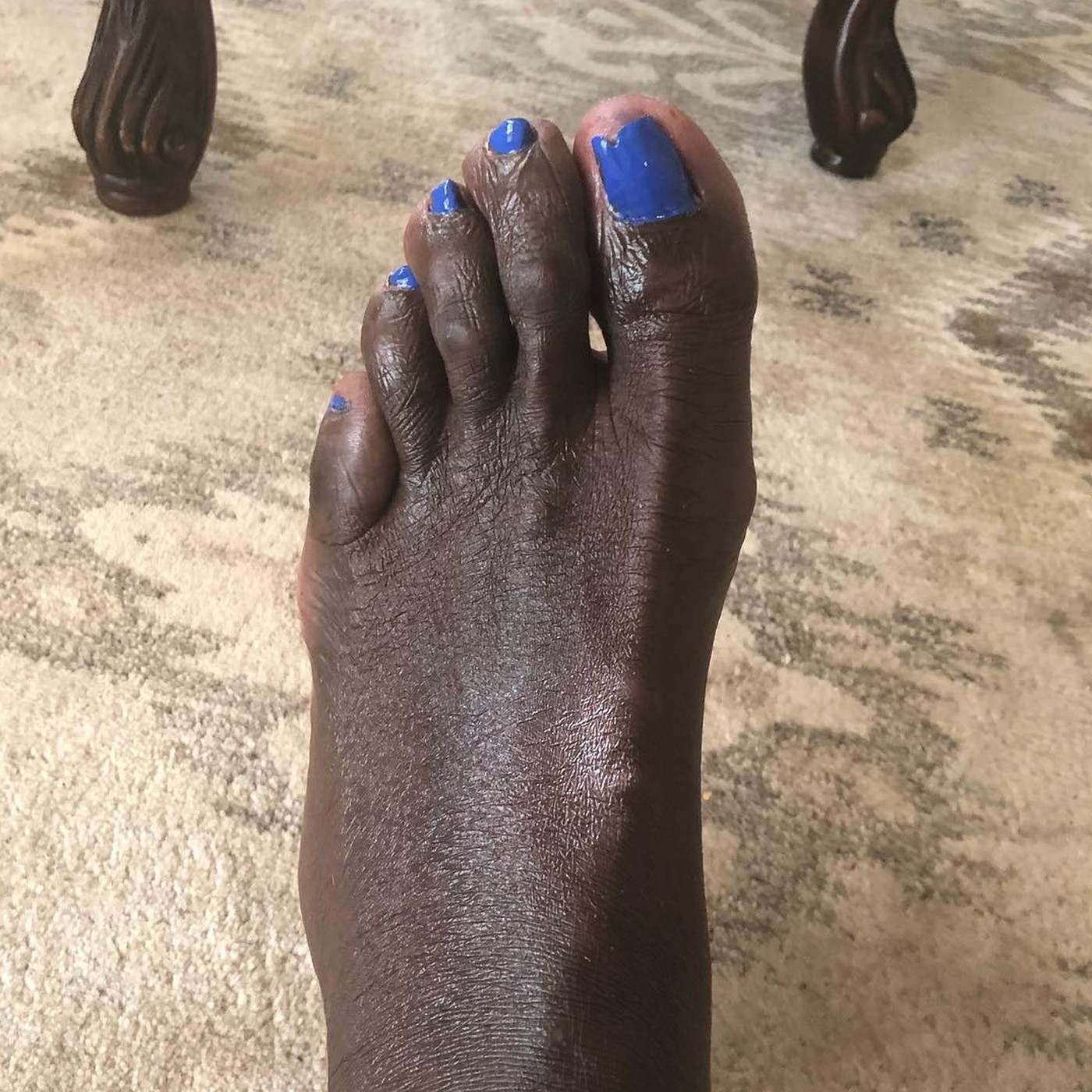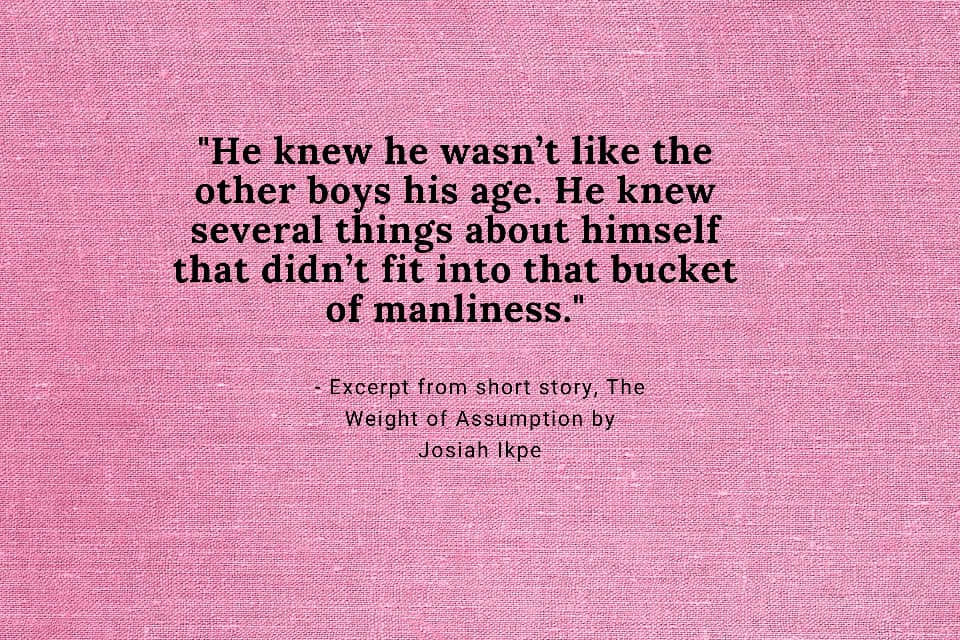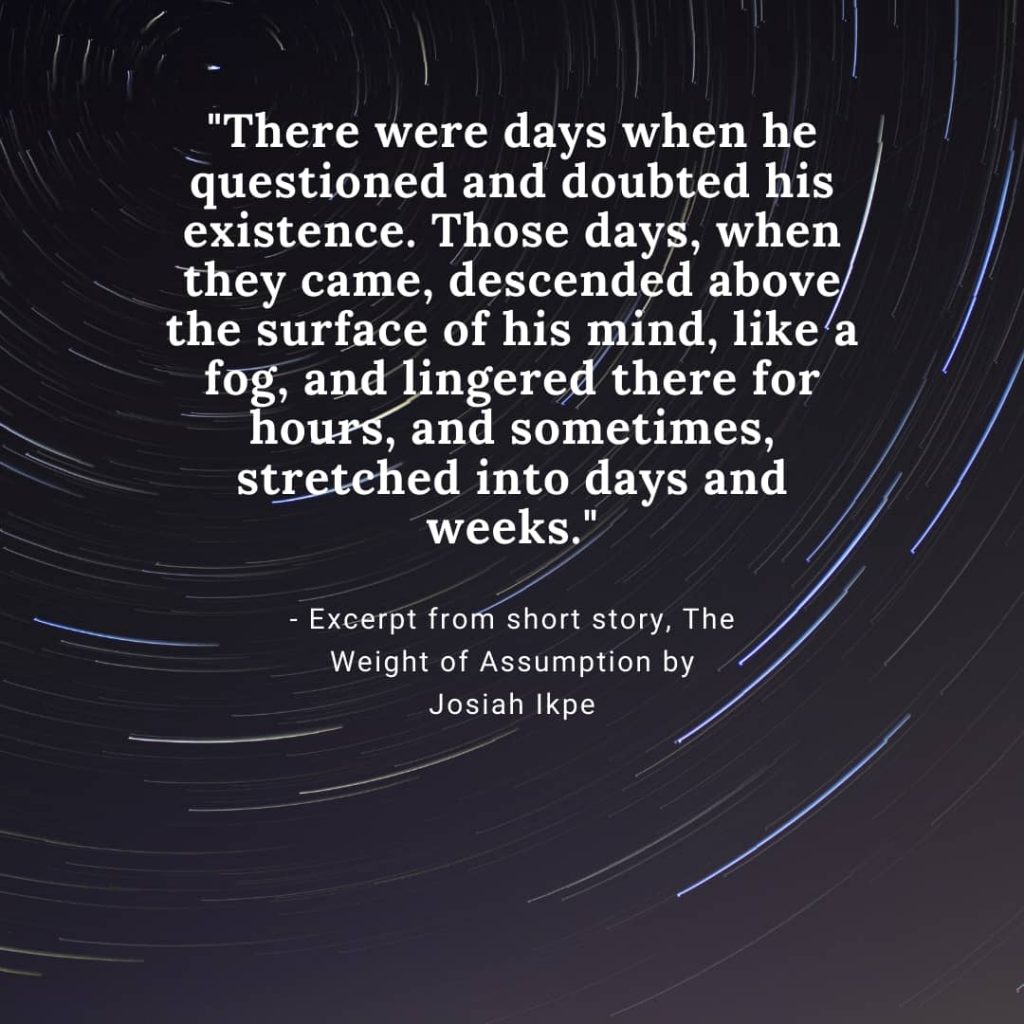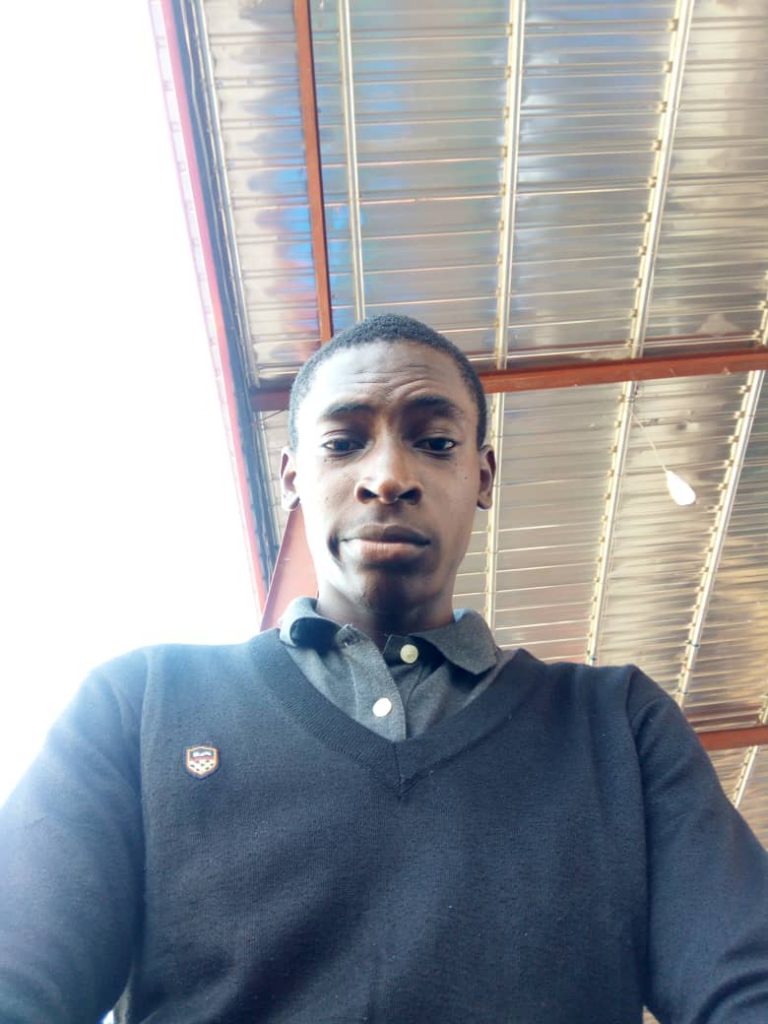
The Weight of Assumption
Your voice ascends to the sky; deep, high-pitched, husky. The earth receives the tears falling furiously down your face; catarrh, dripping down your nostril. As tons of bodies cluster all around you, the wind beats into your ears as you try to struggle and break free from their circles. Their eyes are unrelenting, hands landing on you from all directions. You try shielding your face with your arms but their grip on you makes it virtually impossible to. You shiver and writhe, your hands darting from one end to another. A fist alights on your chin. A knee lands on your jaw. Another falls on your stomach. You let out a loud cry, your expression gradually closing up. You then try to move your lips so you could plead with them, but they wouldn’t move; they felt heavy and were hurting badly. Their voices burrow down into the earth, solidifying a foundation of abhorrence, and rapidly rises back up with the utterance of wild hatred.
Teach him a lesson.
No, let’s kill him.
Let’s make him know that his kind is not welcomed here.
Your eyes are all bloodshot. You close them and allow your mind to drift into memory.
**
He knew he wasn’t like the other boys his age. He knew several things about himself that didn’t fit into that bucket of manliness. The way he walked, the sound of his voice, how his hands darted in the air whenever he spoke, and how his interest didn’t align with the interest of other boys, spoke much about his difference. Right from childhood, the difference had always been glaring, obvious, and open. Once, Ayo, the boy who other boys looked up to and followed about had said to him, ‘You’re not a boy. You are a girl. Go join your fellow girls and play,’ when he made an interest to join them and play. Ayo’s words had stung him. He looked at his face and had seen that satisfaction one got when one’s desires have been met. In Ayo’s eyes, he had seen a certain kind of fulfilment darting within the circles of utmost joy.
Now, as a young man venturing into his late-twenties, to be this way was to carry along the weight of assumption. It was to be looked at and called various names. Names that are absurd, meaningless, that didn’t make sense to him, but that he just had to bear with because bearing and owning it was the only option he was allowed to have. So, he’d mastered the art of smiling back and showing his uneven front teeth whenever he was called one of those names.
When he first moved into his place, he thought he was moving into peace, freedom, and space; a longing that had always been in his heart, bubbling and earnestly waiting for the right time of manifestation. But little did he know that his neighbours, a group of lanky, rugged, and shaggy looking men, who stayed next doors and did nothing with their time other than playing loud music and shouting all day, would be the prelude of a long and dreadful nightmare.
The day he moved in, a block of six flats and his being on the down floor, his mother called and they both spoke at length, sporadically, the sound of their voices raspy. Her words were comforting, jarring, and alarming all at once.
‘How are you finding the place, my son? Okay? Better?’ she asked.
‘It’s okay, ma. The place is okay.’ he said, careful of his words and choice of language.
‘Are you sure?’ she asked again.
‘Yes, mama. I am sure. The place is okay.’ he said with a voice filled with assurance and confidence.
There was a slight pause from both ends, a minute or two. He knew she hadn’t ended the call because he could still hear her slow and steady intake of breath. He fumbled with the lock of his bag, which was sitting right in front of him, zipping and unlocking it over and over again. He thought to break the silence as it was becoming more awkward and overt, but he didn’t know which words to break it with, and even if he did, he wasn’t particularly sure how to go about it.
‘I, uhm, mama,’
‘I just want you to know,’ her voice came in abruptly, overtaking his mid-way, ‘that I love you. Although I don’t accept and understand this your new reality, still, you’re my son and I’d continue loving you no matter what.’
‘Thank you, ma.’ he said, slightly below whispers.
‘There are people who would come at you and who would do anything to make you uncomfortable, but what I ask of you is that you shouldn’t flaunt it at their face and call yourself it.’ There was another pause, but this time it was from her end and it didn’t last that long. ‘You can still change my son. There’s nothing that cannot be prayed away.’ She said and stopped, the sound of her breathing sliding into his ears.
‘Mama, I have to go now. I need to get my stuff in place.’ He said and shut his eyes tight.
‘God be with you my son. Stay well.’ She said.
‘Goodbye, ma.’ he whispered, brought the phone down from his ears, and stared at it, the call still ongoing, each second rapidly counting. His hand hung mid-air, but after a minute or so, he brought it down and terminated the call.
His mother’s use of the pronoun, it, choked him and reverberated all through the walls of his mind. Her use of the word, it, as though it had no name. Her use of the word, it, as though mentioning its name was heavy and poisonous to the tongue, as though it was a sacrilege for the lips to utter, and as though oblivious to its name meant it could be tucked away underneath piles of garbage and subsequently burnt into ashes.
His forehead furrowed, tears gradually welling around his eyes. He curled himself up on the floor and rested his head on his arms. Staring into oblivion, his mind unmarked by anything unique, an occurrence from his childhood flashed itself before his face. He closed his eyes and opened them again. With the swollen state of his heart, his entire being, the sequence of the event from his childhood began acting itself out, and he laid still and watched as his eighteen-year-old self and his mother slowly take up life.
‘Put your feet firmly on the ground and walk like a man.’ She said to him one morning when he was taking out the trash. To comply, he unknowingly struck his right foot against one of the stones placed beside the wastebasket. He screamed and the corner of his eyes crinkled. On hearing his voice, she ran towards where he was, and on seeing the blood gushing out of his hallux, she dragged the silk scarf off her head and hurriedly tied it around the wounded part. She fixed her gaze on him, and he fixed his back on her, and at that moment, though fleeting but eventful, the cord that connected him and she expanded and thickened the more.

Slowly, as his mind jolted back to reality and its present state, his expression closed up and his skin went white. He carried himself up from the floor, though his heart was heavy and still weighed down with thoughts, he went on and emptied the polythene bag loaded with detergents and soaps on the bare floor.
A week and a few days after settling in, Martin, his closest friend, visited. He and Martin had been friends right from their university days, and ever since that period onward, their friendship blossomed and grew much more than they had both imagined. Their friendship bordered on an intimacy that arose from possessing a body that was one thing, made to be that thing, but exhibited the features of another.
Back then during their university days, they were constantly teased and laughed at and called all sorts of names – mostly those that had to do with their feminine nature. He, on one hand, had always been conscious of this, which in some ways, made him tune it down and act in that manner expected of him as a man and as one wearing the body of that sex. But Martin, on the other hand, was bold and daring, didn’t give a rat’s arse of what anyone thought, and would, from time to time, snap back at anyone who made him feel less about himself or his body. His gesticulations and how words flew out of his mouth, defined him as one thing, only one thing.
‘I think I should move in with you. What do you say?’ Martin asked, laying on the floor and spinning the glass cup in his hands.
He chortled, almost spitting out the hot plantain he was eating. ‘I don’t think it would work,’ he said, his lips splattering into a smile, ‘It’s a big no.’
‘Ahh ah! Why?’ Martin asked, taking the last piece of plantain from the ceramic bowl.
‘Nothing really.’
‘Don’t give me that. Open up.’ Martin said, now sitting erect, a vein popping out of his neck.
‘It’s nothing Martin. You know, I just need my own space and privacy.’ He said, gazing into vacancy, his forehead creased.
‘Well, I knew it,’ Martin sniffed, ‘I knew that I’ve always been a disturbance to you.’ He said, feigning annoyance.
‘Don’t say rubbish, Martin.’ He said, a corner of his mouth lifting.
For a slight minute, the idea roamed through his mind. The idea of Martin moving in with him. And it wasn’t as if it was a bad one, but it was that it just wouldn’t work. He had always craved for this, his place and space, and now that he has finally gotten it, he wasn’t willing to give it up or share it with anyone else. Moreover, no doubt, he adored and appreciated Martin a lot, but he was someone that doesn’t run out of conversations. Having him here, with him, would mean talking long into the night each day, old conversations rolling into new ones, words springing out of his lips like a running faucet, and that itself wouldn’t go well with his writing and the ample time needed to reorganize the plot of his novel.
‘I’m not saying trash, James. But frankly, this is something you’ve always wanted and I’m happy you’ve gotten it now.’ Martin said, his eyes sparkled. ‘Just make sure you write about us well in whatever you’re writing.’
‘I’d try.’ he said, smiling. ‘This means a lot,’ he paused, looked at Martin, his eyes welling up. ‘Thank you.’
‘I’m going to cry now.’ Martin whispered, feigning tears and at the same time, using the back of his hands to wipe them off.
‘Are you seriously crying?’ he asked, his brows tightening.
‘No, I’m not. Why would I? Martin said. They both laughed, their laughter attuning, the sound of their laughter reverberating.
After seeing Martin off and now heading back to his flat, his mind abated of so many uncertainties, he overheard what they – his next-door neighbours – were saying amongst themselves. He slowed his pace and paused. Standing just a few distances away from where they were, four of them ungainly standing and sitting by the entrance of their flat, and each holding a can of malt, his gaze fell on them. And they – fully aware of his presence and also staring right back at him – kept on talking as though his standing there, right in front of them, was inconsequential and appalling. At that moment, he became certain that their aim wasn’t for him to overhear them, but it was for him to hear what they were saying loud and clear. Even as they spoke, their faces were streamlined with disgust, one which he was familiar with. And their words, igniting old memories, were demeaning and impairing.
One of them then said, in a husky and croaky voice, something about how his bodily movement was similar to that of a girl and how he drags the whole concept of maleness and masculinity through the mud. Another one of them said, this time in a coherent and high-pitched voice, that he shouldn’t bring his girliness and silly attitudes near him.
On hearing that, he felt a visceral panic spreading through his legs, which made his feet above the ground shaky and unstable. He tried stilling himself, comporting his body to look firm and unhurt by their words, but all effort to didn’t yield any results. And even as he stood there, glued to that spot, various thoughts darted through his mind. Eventually, as tiny bits of courage fell upon him, he moved, placing one leg in front of another and deciding to let their comments, no matter how nasty it was, fall on empty ground.
However, as he approached the door to his flat, just a few more steps to cover, the one sitting on a plastic chair, who appeared to be the oldest of them all, stood up immediately and said something about himself quickly running into the house before this guy starts fantasizing about his body and his ass.
He paused, raised his eyebrows, and turned back. Having to hear that struck a certain kind of anger and humour within him. This, he thought, was the height of it. He looked at the man, his eyes darting with resentment. How ludicrous, he thought. How on earth would he, of all things to think of and fantasize about, choose to waste his mind and thoughts fantasizing about such a person? And even if he chose to, would he bring himself that low to think about someone of his kind, a layabout, stinking, jobless, no prospect person?
He plastered a smile on his face. Courage was something that he had never experienced or felt before. Of course, he had seen it in people and heard about it from people – a certain kind of strength that envelops one during the dire of situations – but he had never in his life felt its strength clothing him before. But on this day, one momentous evening when the sun was retiring to sleep and the breeze, soothing to the skin, he felt courage diffusing through his body, touching cells and ligaments, muscles, and bones. He looked at the faces of each person, his uneven front teeth escaping from his mouth, and said,
‘Not even in my wildest dreams would you be the centre of my imagination. Yes, you all should get a job.’ He said and gaited off.

Jamming the door shut and resting his back on the door, he slid down to the ground. His whole face lit up. His lips curving into a smile, he laughed and laughed, and in the midst of this sudden and maybe, unhealthy laughter, he felt his muscles easing up and satisfaction gathering within his chest, and he knew, quite well, that Martin would be immensely proud of him.
There were days when he questioned and doubted his existence. Those days, when they came, descended above the surface of his mind, like a fog, and lingered there for hours, and sometimes, stretched into days and weeks. Fortunately, today happened not to be one of those days. Today, he was light-hearted, his mind freed from constant worries and fear. Excitement glowed in his eyes, and he felt a sense of ease enveloping him and his entire being. He couldn’t tell why or point directly to the source of this particular happiness bubbling within him. Maybe it was the incident that took place between him and his neighbours last week. Or maybe it was the raise he got, as he was promised by his employer for the overwhelming column he wrote days back. Or maybe it was the call he got from his father just this morning, considering how sour their relationship had been these last few months. Or maybe it was a hybrid of all those reasons. Or just maybe it was none of those reasons at all, being that he decided on his own accord to be happy and chose not to allow any reason or situation to be the source of his present disposition. Whatever it was, he was glad its hold on him was firm and satisfying.
As he sat within the enclosure of the office cubicle, revising and editing a column he started and finished writing last night, his mind hauled him back to where and to the point this passion for writing had begun. Going back and strolling through those times his admission into the university had slightly been delayed – for a year or two and due to situations beyond his control – through reading, books he bought at thrift shops for discounted prices, and sometimes, at prized bookstores, he discovered this immense love for writing. And having seen and read somewhere that there’d come a point in one’s life when one would need to stop reading other people’s books and write one’s own, he began writing.
At first, he started with a novel but abandoned it much later due to the intricacy involved in writing one, and then, after a while, he began writing short stories. They didn’t come along pretty well, the stories, but after putting in much of that needed work – perseverance, editing, and writing through the doubts and uncertainties – they grew and took form and became something. And so, when he began with his admission processes afresh, having known already that writing was what he wanted to do, the course to study became a thing. He looked up courses in The Humanities and The Social Sciences, and deciding not to study neither English nor Literature because he felt that studying either one of them would, in some ways, stifle and smother his writing, he finally, painstaking, opted for a course in The Social Sciences.
Looking back at those days and thinking about them now, having had the privilege of obtaining a degree in Political Science and presently working as a Columnist in a progressive newspaper company, he could say, without mincing words, that he had been right. If he had, perhaps studied either one of those courses, he probably wouldn’t have been here today, writing and doing what he loved most. Maybe he would have been in bed now, drowning himself reading too many philosophical books, which are great by the way, and being too critical of the questions and awareness behind the process of storytelling and literature in general.
This made him think of Mabel, an English student he became friends with in his third year in school, and who, by the way, read great literature, but was too critical of the rationale behind storytelling. She always read with a theoretical paradigm at the back of her mind, which he had found somewhat harmful to the joy of storytelling and just reading literature without necessarily concerning oneself about the questions and the rationale behind it. Her choice in books was a bit odd. She preferred puzzling books, one which would cause a shift in her thinking. So, it was no surprise when she told him one sunny afternoon that she thought and believed contemporary Fiction to be too loose, too unrestrained, too overstated, and careless even.
Falling back to his chair, his mouth twitched and his eyes widened. For everything worth it now, he was content. Content to be here, still living and fighting.
They all assumed you were something, something awful and displeasing to look upon or talk about. Sometimes, when there were reasons enough to talk about it – you and what they believed you to be – it was always done with contempt and mostly to your hearing, their tune scornful. And the weight of their assumptions, even as months passed by and as days crawled into another, was heavy on you. So, this made you to, somewhere along the line, familiarize yourself with the art of strapping them prudently at your back, mindful of the turns your body took.
No doubt, you were tired of people assuming who you were, of who you liked, and of the sex you were attracted to, but you were least surprised when the weight of their assumptions also made them – your neighbours – knock at your door one cold night, a few hours after you got back from work, and forceful dragged you out of your flat, and without a hint, started throwing their fists and hands on you, and at the same time, flinging hateful words at you.
Encircled by their bodies and gazes, recognition dawned on your face. You raised your head upward and glanced into the sky, and on seeing the stars illuminating brightly than you had ever seen before, you felt intrepid ease engulfing you.
About the author

Josiah Ikpe is a storyteller, one who is constantly evolving, and a book lover, born and raised in Lagos. Right from childhood, he had always nursed this crazy fantasy of being a character in books. Ikpe’s works have appeared in Kalahari Review, Nnoko Stories, The BIA Africa Initiative, Tea Light Press, The Mark Literary Review, Lanke Review, among others. He writes so he could inhabit bodies that are not his. He’s presently a Law student at the University of Ibadan.
Twitter handle – @josiahikpe.
Also read: Ned Nwoko Biography: Regina Daniels husband, Ned Nwoko net worth & more
Also read: Pastor David Wilson Biography: Pastor Wilson video, Corinthia Edwards & more [Video]




Average Rating